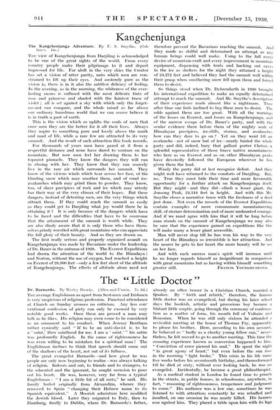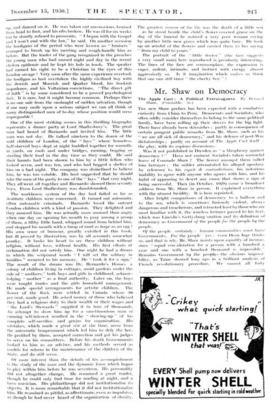The "Littl e Doctor"
Dr. Barnard°. By Wesley Breads-. (Allen and tnwin. 7s. ed.) THE average Englishman as apart from Scotsmen and Irishmen is very suspicious of religious profession. Punctual attendance at Church on Sunday arouses no criticism. Any less con- ventional confession of piety can only be excused by very notable good works. Once these are proved a man may talk as he likes. His religion may even come to be considered as an .ornament to his conduct. When Jeremy Bentham rather cynically said "It to be an anti-slavist is to be
'saint,' then sainthood for me, I am a 'saint,'" his satire was profoundly English. In the cause of righteousness he was even willing to be mistaken for a spiritual inan ! The Englishman inclines to think that speech should come out of the shallows of the heart, not out of its fullness.
The great evangelist Barnardo—and how great he was people are only now beginning to realize—was always talking of religion: Indoors and out, to friends and to strangers, to the educated and the ignorant, he sought occasion to pour out his heart. Ile was, however, very far from a typical Englishman : "I am a little bit of all sorts," he said. His family hailed originally from Alexandria, • whence they removed to Spain changing their Hebrew namer to its Spanish equivalent." A Moorish admixture here rriodified the Jewish blood. Later they migrated to Italy, then to Hamburg, finally to Dublin, where Dr. Bernardo's father, -
already an office bearer in a Christian Church, married Quaker. By birth and rebirth," therefore, the famous little doctor was an evangelical, but during his later school days the bookish, artistic and precocious boy became a blatant little sceptic, going through the ceremony of confirma- tion as a matter of form, his mouth full of Voltaire anti Rousseau. When he was Still only sixteen he attended a revivalist meeting at the house of Thomas Fry, apparently to please his brother. Here, according to his own account, he behaved as " badly as a cheeky young fellow can," never- theless, he felt moved to go to another meeting. This time the amazing experience known as conversion happened to him. " Conviction of error pierced his soul." He spent the night " in great agony of heart," but even before the sun rose in the morning "light broke." This crisis in his life came five weeks before his seventeenth birthday, and thenceforward till he died at sixty, without ever looking back, he WAS an evangelist. Incidentally, he became a great philanthropist.
As a medical student in London he found time to preach in the streets, in public houses, in schoolrooms, anywhere, in fact, "reasoning of righteousness, temperance and judgment to come." His audience was a low one, sometimes he was listened to With attention; constantly he was rebuffed and insulted, on one occasion he was nearly killed. His hearers rose against him: They placed a table upon him with itS legs
up, and danced on it. lie was taken out unconscious, bruised from head to foot, and his ribs broken. He was ill for six weeks Inn lie stoutly refused to prosecute. "I began with the Gospel and I won't end with the law," he said. On another occasion the hooligans of the period who were known as " bruisers arranged to break up his meeting and rough-handle I as before. But the leader of the gang recognized in the preacher the young man who had nursed night and day in the recent tholera epidemic and he kept his lads in leash. The speaker had earned his right to be a Christian in the eyes of this London savage ! Very soon after the same experience overtook the hooligan as hi&iil overtaken the highly civilized boy with his Jewish and Moorish and Quaker blood, his bookish impudence, and his Voltairian eonvictions. The direct gift if faith " is by some considered to be a proved psychological fact. It is rare, but it might beeome common. Perhaps there is no one safe from the onslaught of sudden salvation, though if one may smile upon a serious subject we can all think of malty distinguished Well of to-day whose position would seem impregnable !
One of the nmst striking scenes in this thrilling biography represents a di llll er party at Lord Shaftesbury's. The great man had heard of Barnardo and invited him. The little man was uot shy. Ile talked nineteen to the dozen of the wild children of London, of the " lays " where- homeless. half-starved boys slept at night huddled together for warmth. in yards, on roofs and under bridges, earning, begging or stealing their food in the day time as they could. Ile said their haunts had been shown to I by a little fellow who looked seven, and was ten, and who had begged a shelter of him on a bad night. The company was disinclined to believe him, he was too voluble. His host suggested that he should take the 11101 of the party to one of the " lays " that very night. They all went off together and Barnanlo showed them seventy boys. EVCII Lord Shaftesbury was dumbfounded.
The workhouse system of the day had failed so far as destitute Milliken were concerned. It turned out automata.
often automatic criminals. Barnard() loved the outcast London children with a kind of passion. They delighted and they amused him. He was actually more amused tham angry when one day on opening his mouth to pray among a gnmp of them, a filthy little hand, whipped I from bet I him.
and stopped hi, mouth with a I p of mud as large as an egg ! His own sense of' humour, greatly extolled in this hunk. but ill proved by illustration, was by all accounts somewhat pranky. It broke his heart to sec these children without religion, without love, without health. His first efforts at reclamation did not satisfy him. One night he had a dreamt in which the scriptural words " I will set the solitary in families " recurred to his 111C11101y. •• took it for a sign." The result of the dream was De. Barnardo's thanes a colony of children living in cottages, amid gardens under Ihe nate of " mothers," both boys and girls ill Vilild1100d, mother "' as a final authority. 1.ater on, the boys were taught trades and the girls household management. Ile made special arrangements for artistic children. The Rower of the flock were settled in Canada where 98 per cent. made good. He asked money of those who believed they had a religious duty to their wealth or their wages anal " the Lord's Stewards " supplied it in tells of thousands. An attempt to show him up for a sanctimonious man of cunning' self-interest resulted in the showing-up " of his eomplete self-sacrifice and genius for organization. Ills mistakes, which. Made a great stir at the time, arose from the autocratic temperament which led hint to defy the law. Ile profited by them, accepted correction and got his judges to serve on his Committees.. Before his death Govenunents looked to him. as an adviser, and his methods served as naxlels for reform in the maintenance of the children of the State, and do still serve.
Of more interest than the details of his accomplishment is the study of the man and the dynamic force which began to play within him before he was seventeen. Iii-, personality did not altogether change. He remained a great reader, though he could only find time for reading at night, and ii keen musician. His philanthropy did not institutionalize its The greatest. sorrow of his life was the death of a little son - as he stood beside the child's flower-euvered grave on the day of the funeral he notiml a very poor woman erying by another little new gntve which was quite hare. lie took tap an armful of the flowers and carried them to her san iuig " from my child to yours."
The portrait of the " little doctor " (the faee suggests a Very small man) here reproduced is peculiarly interesting. The lines of the face Ilre COI lllllll opkw('. the expression is eager, ardent, intimate, and instinct with energy - almost aggressively so. Is it imagination which makes us think that one can still truce " the ehecky boy " ?















































 Previous page
Previous page